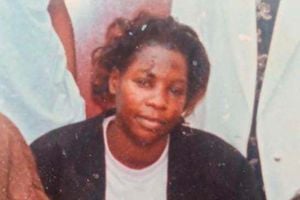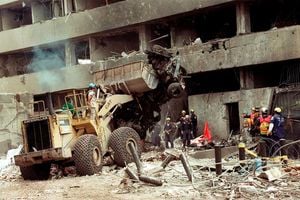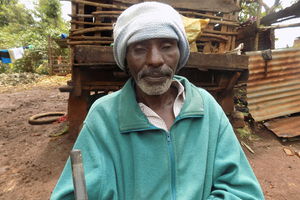
Ms Agnes Kambo and Enoch Moenga, survivors of the 1998 bomb blast at the Bomb Blast Memorial Park in Nairobi on 7 August 2024 during the 26th commemoration of the August 7, 1998 bomb attack.
On August 7, 1998, at just past 10am, Nairobi was transformed into a scene of unspeakable horror.
The morning, which had started like any other, was abruptly shattered by two devastating explosions at the entrance of the US Embassy.
Those who witnessed the blast have been left with haunting memories and unrelenting grief.
For many survivors, the impact of that day extends far beyond the physical injuries; it is a deep emotional scar etched into their hearts and minds.
The aftermath was a vivid display of devastation: the anguished cries of those hurt, the desperate actions of emergency responders, and the solemn vigil of a city grappling with its grief.
Few remember the streets were scattered with wreckage, and the air was thick with sorrow and desolation.
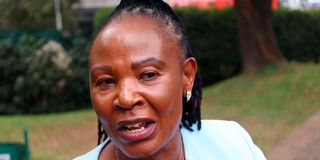
Ms Agnes Kambo, a survivor of the 1998 bomb blast, is pictured at the Bomb Blast Memorial Park in Nairobi on August 7, 2024, during the 26th commemoration of the August 7, 1998 bomb blast.
Even as the years have gone by, the pain endures, a relentless reminder of the delicate nature of peace and the enduring cost of conflict.
For Agnes Kambo, the morning that was once filled with the promise of routine turned into a scene of unspeakable destruction.
Ms Kombo was working as a driver for the Kenya Broadcasting Corporation (KBC) outside the American Embassy.
She was waiting for her colleagues, who had gone inside to cover a meeting.
A nightmare
The routine task soon turned into a nightmare when Agnes witnessed a car speeding erratically into the embassy compound, followed by a series of catastrophic explosions.
“While I was there, I saw a lorry speeding down Haile Selassie Avenue. It entered the American Embassy through the wrong side, and I was immediately drawn to it because of its alarming speed. I thought they might be transporting something valuable, like money, given how fast they were moving. I watched as the lorry drove straight into the embassy, but since I was not right outside the embassy, I couldn't see exactly where it went or what happened next. After a while, I heard a faint sound and then saw people fleeing the area. At that time, the American Embassy was usually crowded with people coming to apply for visas and other services. As I watched people running away, I heard a second, louder explosion. At that moment, I felt a deep sense of fear and thought to myself that this situation was incredibly terrifying, almost as if it were a nightmare,” she recalled.
Ms Kombo further recalled that just a few seconds after hearing the faint sounds, she experienced the blast itself and lost consciousness, collapsing in the car.
“I remember the blast itself, and then everything went black. I lost consciousness and don’t recall much beyond that. Before the explosion, I saw the vehicle—the driver and two passengers—arriving. They were getting into the car, and I saw them clearly. Later, the driver reversed the vehicle back to the spot where I was. At the time, I didn’t realise what was happening or feel any particular concern. I thought they were just moving the car.”
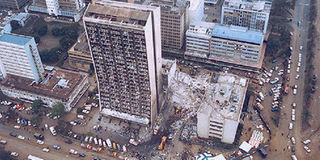
The aftermath of the bombing of the US Embassy in Nairobi on August 7, 1998. The US Supreme Court on May 18, 2020 ruled that Sudan must pay hundreds of millions of dollars in punitive damages to some victims of the 1998 attacks. PHOTO | FILE | NATION MEDIA GROUP
“Then I heard three distinct sounds. After a while, I regained consciousness. I touched my fingers and realized I was still alive. I shook my head to clear it and confirmed that I was indeed alive, so I decided to run away,” she said.
The blasts sent Agnes into a state of disorientation. Her car, once a symbol of safety, was soon engulfed in flames, forcing her to abandon it.
Excruciating pain
Injured and in excruciating pain, she struggled to move, her mind clouded by fear and confusion.
A bystander, seeing her plight, rushed to her aid, guiding her through the chaos to Kenyatta National Hospital.
“I felt as if I were dead, walking like a lifeless body. A Good Samaritan came to my aid, but I noticed I couldn't move as quickly as I used to when I was alone. He ran alongside me and held me because he saw how laboured my breathing was. He offered to get a car to take me to the hospital,” she says.
“At that moment, I screamed in shock, realising that the voice I heard was not mine. My voice seemed to come from my neck, and when I touched it, my fingers went through the wound. I looked at myself and saw that my clothes were drenched in blood, and my hand was already broken. Overcome with despair, I began crying and pleading for help to be taken to the hospital,” she added.
Ms Kambo’s journey did not end with her hospital discharge.
She faced a long, painful recovery, burdened by ongoing health issues like breathing difficulties and hearing loss.
The emotional scars of that day have left her struggling with a changed reality, while the lack of compensation or recognition from the American Embassy adds to her heartache.
"My life has been forever marked by that day. The physical pain is constant, but the emotional toll is even greater. My family has had to cope with the changes, and the hope for justice and support feels like a distant dream,” she said.
“My ear on this side has an issue with the eardrum. The doctor advised me to get hearing aids because, even when I talk to you, I can hear some noises in my head. The cost of hearing aids, according to the doctor, is Sh250,000. If the American Embassy can't provide compensation, we need to find a way to afford hospital treatment and get the help we need. We don't want to live with this pain and suffering,” she added.
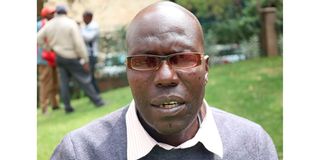
Enoch Moenga,a survivor of the 1998 bomb blast is pictured at the Bomb Blast Memorial Park in Nairobi on August 7,2024
For Enoch Moenga, who was working as a field officer at the time of the attack, his life turned upside down, and what initially seemed like a scene from a movie ended up becoming his reality.
“After finishing my duties, I was near the American Embassy when I saw traffic and people shooting towards the building. We were stunned, feeling as if we were in a movie, and stayed to witness the events so we could later inform others about what happened. We felt as though we were waiting to die,” he said.
The attack left Moenga with profound and harrowing injuries—he lost one eye, and several teeth, and his body was riddled with wounds.
He was found alive, buried beneath the weight of dead bodies, and rushed to Aga Khan University Hospital.
After enduring two weeks of intensive care, he was transferred to Kenyatta Hospital, where a series of surgeries aimed to repair his eye and remove the damaged teeth.
These procedures left him with permanent, visible scars, each one a painful reminder of the attack.
“The attack left me with severe injuries—I lost one eye, several teeth, and my body was covered in wounds. They found me alive but buried under dead bodies,” Moenga recalls.
The aftermath of this tragedy was nothing short of devastating.
Moenga lost his job, plunging him into financial hardship and daily struggles to secure basic necessities.
As a young man bearing visible scars, he was met with harsh social rejection and prejudice, with some perceiving him as a thief or even a monster. The emotional and psychological toll of this judgment compounded his suffering, making his journey to recovery even more arduous.
“Finding food quickly became a struggle, and as a young man with visible scars, I faced social rejection. People thought I was a thief or even a monster. My family spent a significant amount on medical bills, and for five years, I had to visit the hospital daily, which became a heavy financial burden. Despite our efforts, we have not received any compensation. I live in constant fear, as every small noise terrifies me. In our WhatsApp group, we hear about other survivors passing away, which only heightens my anxiety about the future,” he said.

